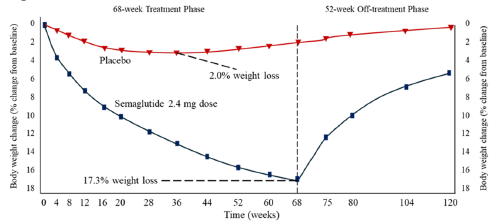GLP-1 Drugs and Weight Loss: What You Need to Know You’ve probably heard of medications like Ozempic, Wegovy, or Mounjaro—maybe from your doctor, a friend, or even social media. These are GLP-1 drugs, and they’re gaining popularity for their role in weight loss. But what are they, and how do they really work? Here’s what you need to know as someone working on your health and fitness journey.
What Are GLP-1 Drugs? GLP-1 stands for “glucagon-like peptide-1.” It’s a hormone your body naturally produces to help regulate blood sugar levels. GLP-1 medications were originally designed to help people with type 2 diabetes, but doctors discovered something interesting: at higher doses, these drugs also help with weight loss.
How? GLP-1 drugs:
1. Regulate blood sugar homeostasis by stimulating insulin production and enhances glucose sensitivity. 2. Influences brain regions related to hunger and satiation in larger doses and can influence the vagal nerve signaling for gut to brain (aka enteric nervous system) 3. Stimulates the vagal nerve to slow gastric emptying which results in slower digestion. 4. May effect sensory learning associations by blunting specific food seeking behaviors which often occur with cravings. It may also impact the brains Sensory-specific Satiety (SSS) response to sweet, fatty foods and alcohol. 5. Counter regulates the effects of insulin to ensure blood glucose homeostasis and can be an energy mobilizer.
New studies are revealing potential new benefits beyond diabetes and weight loss**: 1. Cardiovascular protection – reduces heart rate risk through protective effects on myocardial cells and blood vessels, lowering blood pressure and improving lipid panels. 2. Neuroprotective effects – Studies suggest inflammation reduction and neuroprotective effect against degenerate cognitive diseases (like Alzheimer’s disease) 3. Kidney health – Promise in slowing progression of kidney disease, particularly in diabetics. 4. Fatty liver disease treatment (potentially) 5. Improved metabolic health – combined weight training to preserve muscle mass. 6. Sleep apnea - mostly due to weight loss. **Studies acknowledge that many of these effects may be due to the weight loss itself.
But aren't there crazy side effects? You may have also heard about some side effects that individuals can experience. Just like any other drug, there can be side effects. The most common side effects are stomach issues and discomfort such as: nausea, abdominal pain, constipation, diarrhea. Possible other side effects demonstrated are eye health hand vision changes – wet (AMD), this particular side effect is raising concerns over long term use, increased heart rate and depression or suicidal thoughts. These side effects can sound scary. In most cases the benefits to weight loss in obese individuals outweigh the side effects from the drug.
Do they work?? YES! But not as magical as you think!
Check out the chart at the bottom of this email! It will show you 1,961 people divided into 2 groups. They had no diabetes but based on their BMI, they were considered obese. In blue are individuals that received a 2.4 mg semaglutide 52 week treatment phase after a 16 week ‘escalation phase’. In red are the individuals that received nutrition coaching and a placebo during that same time. Both included a 52 week off treatment phase. As you can see, the individuals receiving the semaglutide treatment lost significantly more weight than the control group but gained most of that weight back. During the treatment phase the semaglutide users lost a total of 17.3% of their weight while the control group lost 2%. However, during the off treatment plan, the semaglutide users (who were no longer using semaglutides at that time) regained 11.6% while the control group only regained 1.9%. Ultimately, the semaglutide users still ended up with more weight loss by the end of the 120 week study. Seriously, scroll down and check out the chart, its crazy. Also, a huge thing to note is in the semaglutide users 17.3% weight loss, 40% of it was lean body mass, that’s muscle!! Which can also possibly cause bone density losses. This is exactly why IF YOU ARE CURRENTLY TAKING A GLP-1 OR YOU ARE THINKING ABOUT TAKING ONE, RESISTENSE TRAINING SHOULD BE A NON-NEGOTIABLE.
This study, and others like it with similar findings, raise concerns for possible addiction or dependency on these drugs. If this drug is used by itself and not with any type of behavioral, lifestyle or nutrition changes then you can bet your bottom dollar that you will end up like the blue line individuals in that study. With more body fat and less muscle mass than you were when you started.
If you’re saying “Wait, the first half of this email you were telling me how great these drugs were, now you’re telling me I will just end up worse than I started?”
Not necessarily. If you do it right, you should see great results!
These are 6 Vital Lifestyle Integrations to stack while you’re using these drugs: 1. Protein intake: Given the appetite suppressing effects of GLP 1 medications, individuals might not only consume fewer calories but inadequate protein needed to prevent muscle loss. Make sure you are getting enough protein every day it should be prioritized every time you eat. 2. Resistance training: Minimizes muscle loss, keeps bones healthy. 3. Work with a trusted medical network/ Healthcare professional while you are using these drugs and after if possible. 4. Frequent Body Compositional Analysis every six to eight weeks during and following your treatment. The InBody is perfect for this. 5. Stress management: make sure to get recovery including physical, emotional, mental. Hormetic stress which is the concept that moderate, controlled stressors can benefit the body, promoting resilience and adaptability, can develop resilience through adaptation. a. Also recognize that ones relationship with food can be used as a self soothing tool and if that comfort suddenly goes away, it could result in other behavioral issues. 6. Behaviors (this should be #1) Use this time to reshape your behaviors and habits. Work with a mental health specialist to learn about and reshape your relationships and responses to food. Learn how to eat intuitively and how to listen to hunger cues. Educate yourself on portion sizes, log the food you eat before and while you are on the drug.
The rising popularity of GLP-1 drugs cannot be ignored. It’s important to remember that they are a tool and not a solution. With the right support and habits, you can use them effectively and build a lifestyle that keeps the results going long after the medications ends. Any successful transformation must include these 5 pillars: movement, muscle, metabolic, mindfulness and mindset.
Comana, F. (2025, July). GLP-1 Drugs and Weight Loss - What you need to know. IDEA World.
|
|

